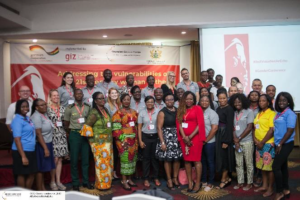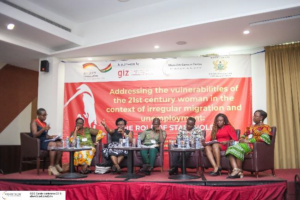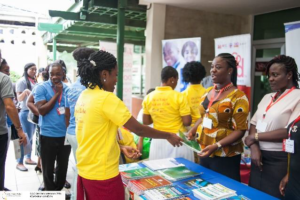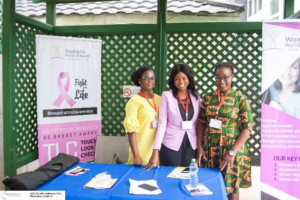Stakeholders urged to be a voice, not an echo on gender and migration related issues.
Gender is critical to the migration phenomenon. Migration is not gender neutral as gender is pivotal to any discussion that bothers on both the causes and the consequences of migration whether regular or irregular migration. In fact, according to the IOM, a person’s sex, gender, identity and sexual orientation shape every stage of the migration experience. Gender influences reasons for migrating, who migrates and to where, how people migrate and the networks they use, opportunities and resources available at destinations, and relations with the country of origin. Risks, vulnerabilities and needs are also shaped in large part by one’s gender, and often vary drastically for different groups.
Migration can, in fact, bring new opportunities for greater gender equality and a better life, for those migrating and those they leave behind. It can have positive impacts on sending and receiving areas. However, as we know, migration also brings risks, and may entrench inequalities around gender.
Migration can advance or impede gender equality. In Ghana, to a large extent, migration has impeded gender equality where women and girls have been relegated to the home and kitchen, thereby leaving them behind their male counterparts in their quest for formal education. This has accelerated gender inequality –
• Rendered women silent and as slaves in their own homes (most prominent in some traditional and cultural settings in Ghana);
• Women not able to make their own life choices (regarding family planning and birth controls),
• Child marriages where young girls of school going age are forced into marriages thereby abandoning their formal education
• Some uncouth traditions and practices like the female genital mutilation (making girls and women feel like second class citizens)
These and many more reasons have made girls and women of modern-day Ghana to take their destiny into their own hands, to make it in live and to have decent and respectable lives of their own. Youth unemployment is a canker and a societal menace which has resulted in the peril of lives through irregular migration, with a devastating decrease in Ghana’s productive human resource base. Unfortunately, many of such women and girls are not well-informed and lack information on the opportunities and perspectives back home in Ghana. They fall as victims to traffickers, smugglers and sexual exploits.
Trafficking in persons is an increasing problem that involves both sexual and labour exploitation and of its victims. Trafficking affects all regions and the majority of countries in the world. Both men and women may be victims of trafficking, but the primary victims worldwide are women and girls, the majority of whom are trafficked for the purpose of sexual exploitation. Traffickers primarily target women because they are disproportionately affected by poverty and discrimination, factors that impede their access to employment, educational opportunities and other resources.
Sex and labor trafficking of women is a complicated phenomenon with many forces that affect women’s decisions to work abroad. Perhaps the strongest factor is a desperate economic situation, which impacts the availability of satisfactory employment in many countries for women more severely than men. Women may become victims of trafficking when they seek assistance to obtain employment, work permits, visas and other travel documents. Traffickers prey on women’s vulnerable circumstances and may lure them into crime networks through deceit and false promises of decent working conditions and fair pay.
Gender-based violence, especially threats directed at women such as sexual and domestic violence, remain a serious regional and global human security concern not leaving out the West African Sub-region, where violence against women is rife. The sheer magnitude of the problem, the lack of services for survivors, the lack of preventative measures and the linkages between violence and the spread of HIV and AIDS and other health and social issues, make the issue of violence against women and children a specific human security concern within the region. In addition, the lack of effective responses by law enforcement officials in and lack of adequate treatment of victims is a contributing factor to the re-victimization and subsequently underreporting of violence against women and children, in turn leading to decreased rate of apprehension and conviction of offenders.
Challenges facing Ghana in achieving gender equality, social protection and women’s empowerment are diverse. The empowerment of women concerns women gaining power and control over their own lives. It involves awareness-raising, building self-confidence, expansion of choices, increased access to and control over resources and actions to transform the structures and institutions which reinforce and perpetuate gender discrimination and inequality.
Institutions and systems that support and respond to violence against women and girls, require the capacity to deal with such crimes in a gender-sensitive manner.
As part of efforts to find lasting solutions to the vulnerabilities of women regarding irregular migration, the Ghanaian-German Centre for Jobs, Migration and Reintegration (GGC) in cooperation with Ghana’s Ministry of Employment and Labour Relations (MELR) on August 21, 2019 organized its maiden gender conference bringing together over 300 stakeholders in Ghana’s capital to address the myriad of problems faced by both men and women in their quest to seek better lives for themselves and their families.
The gender conference themed “Addressing the vulnerabilities of the 21st Century woman in the context of irregular migration and unemployment” provided a platform for stakeholders to discuss and exchange ideas on safe labour migration pathways and its challenges, including trafficking, sexual exploitation and considerations of livelihood alternatives for irregular labour migrants. The conference comes at a time when irregular migration is at the forefront of international agenda both through its inclusion in the Sustainable Development Goals (SDGs) and through the adoption of the Global Compact on Migration (GCM).
The one-day conference sought to achieve the following OBJECTIVES and contribute to the achievement of the Sustainable Development Goals (SDGs) Agenda – Gender Equality (Goal 5); Reduced Inequalities (Goal 10); Decent Work & Economic Growth (Goal 8):
• To increase knowledge, sensitize and provide indepth information on gender and migration to enable men and women make informed decisions which are key to empowering migrants towards a safe migration
• To draw synergies from stakeholder efforts to integrate gender into migration policies and programmes
• To address empowerment and livelihood options for women and other vulnerable groups – with focus on decent work/ employment
• To adequately equip returning migrants and potential migrants with better perspectives in Ghana (entrepreneurial, technical & vocational skills linked with start-up support)
• To identify support systems and other channels of seeking redress; availability and accessibility of such services
The Head of Centre in his opening remarks reiterated the Centre’s commitment to joining hands with relevant partners to be a voice in championing gender related issues and how that impacts on migration. “We want to spark conversations on women and migration related issues, particularly in mobilizing stakeholders to integrate gender into migration policies and all other national programmes. We all know the challenges we face in achieving gender equality, social protection and women’s empowerment are diverse and we want to use this maiden gender conference as the hub in gathering ideas and lasting solutions to these problems and challenges that confront women, men and other vulnerable groups alike,” he said. He urged women to go through the right process to travel and gave the assurance that the Centre will continue to provide information on regular migration.
Our political partner on behalf of the Ghana government, added that “Government owes it a duty to protect Ghanaian women from being victims of charlatans operating in the industry and who in the process expose unsuspecting Ghanaian young ladies to all kinds of inhumane treatment and abuse” adding that government is putting in place measures and mechanisms to rid the industry of illegal agents whose activities are tarnishing the image of Ghana.
A representative of the German Embassy in Accra, noted that with the risks associated with female migrants being more enhanced than those faced by their male counterparts “we must, as a matter of urgency, invest in the formulation of innovative and practical ideas on how regular pathways can be enhanced; as well as harness the opportunities and manage the associated risks”. She added that in order to overcome the structural and systemic factors behind the gender-migration nexus, a synergized approach has to be adopted by all stakeholders: Governments, international organizations, civil society, academia and the private sector all need to make a more concerted effort to mitigate the negative socio-economic effects of female migration.
A six-member panel, Oheneyere Dr. Gifty Dansoa Anti (President and Founder of the Girl in Need Foundation (GiNF); Dr. Angela Dwamenah (Executive Director, The ARK Foundation); Mr. David Darko (IOM); Dr. Rose Mensah-Kutin (Executive Director, ABANTU for Development); Ms. Regina Agyare (Soronko Academy) and Asst. Supt. Richard Owusu-Brinfour (Ghana Immigration Service), had the following discussion points including Women, Safety and Security; Livelihood options, Current Trends of Domestic Work; Employment Opportunities for Women and the Vulnerable; Women In The Corporate World: Unfavorable Conditions of Service – Pay Gap, Maternity Leave, Paternity Leave; How to ensure that women have control over the resources they acquire, e.g., Bank accounts, financial literacy); Harassment, Access To Trainings / Counselling among others.
Some proposals from the panelists regarding the various issues centered on the three Es – Enforcement (of the existing laws regarding irregular migration and laws that protect migrant workers); Engagement (of community leaders in campaigns to promote gender equality and sexual violence prevention and partnerships with national service providers in Ghana to promote the gender equality aspect in their programs ); and Education (about migration issues to reach people at the grass roots level especially illiterates, sharing of stories about the realities of irregular migration, and publicizing the work of service providers such as GGC and IOM so people will know where to seek help, etc.)
About four migrants who have been through the Gulf states also shared their personal stories with participants in the ‘share-to-inspire’ series to serve as a deterrent to people planning on pursuing irregular migration. There was an exhibition of over 20 gender-related support services including counselling, psycho-social support, legal services, livelihood options, etc. available to the general public. Some of companies that exhibited their services include AG Care, Abantu for Development, Prestige Kente, FIDA Ghana, Women’s Trust, e-Skills for Women and Girls, Go Red for Women, Women’s World of Health, among others.
The gender conference ended with a call on participants and key stakeholders to voice out on gender issues in order to influence public policy.
KEY OUTPUTS
• Over 300 participants well informed to be voices for the voiceless
• 4 migrants who have been through the gulf states also shared their personal stories with participants in the ‘share-to-inspire’ series to serve as a deterrent to people planning on pursuing irregular migration
• Panel discussion yielded in-depth awareness and exposition on migration and unemployment topics
• Exhibition by 20 institutions in gender-related support services
CATALOGUE OF OFFERS
A catalogue of offers has been generated from the exhibiting companies at the gender conference to improve and add on to the Centre’s services
• International Federation of Women Lawyers (FIDA) – Ghana – Legal services aimed at poor and indigent women and children who cannot afford legal representation
• Girl in Need Foundation – Assistance for the educational needs of abused girls below the legal age in Ghana
• The Ark Foundation – Provision of empowering spaces, shelter for women, children and the vulnerable in distress and survivors of Sexual and Gender-Based Violence. Also, in partnership with the Centre for trauma relief and prevention
• Women’s Trust – empowers impoverished women and girls with the tools they need to break the cycle of poverty and build a better future
• E-Skills for Women and Girls – Technical skills for women and girls and an online platform to allow knowledge sharing
• Soronko Academy – Training of girls in ICT and entrepreneurship
• Go Red for Women – Advocacy and fundraising dedicated to the control of cardiovascular diseases in women
• Abantu for Development – strengthen the capacity of women to participate in decision-making at all levels
• Network of Women in Growth (NEWIG) – Support for women’s self-organization for full autonomy over their lives, freedom from violence and for full social, economic and political participation and empowerment
• The West Africa Network for Peace Building (WANEP) Ghana – Special focus on collaborative approaches to conflict prevention and peace building, with diverse actors from government, civil society, women groups and other partners to establish a platform for dialogue experience sharing and learning

 GIZ Gender Website
GIZ Gender Website


